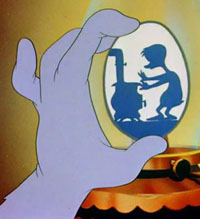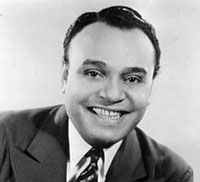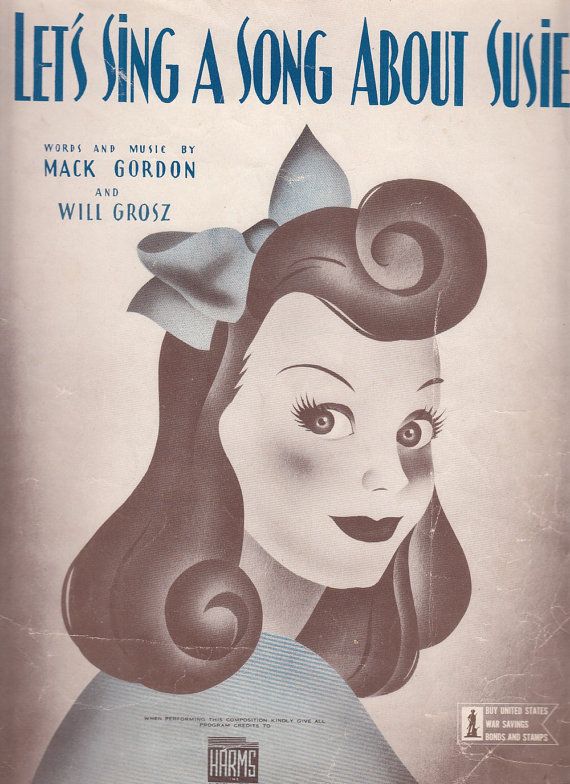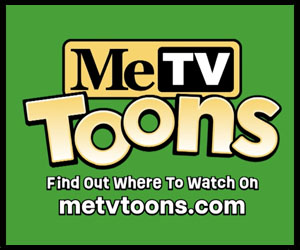Here’s the second installment in a series on music cues used by Carl Stalling under the original main title sequences for Warner Bros. cartoons only seen in re-issue prints.
First, here are two examples of songs Stalling used in other Warners cartoons under main title credits, but also used in films that only exist in “Blue Ribbon” reissues as of this writing.
 “She Broke My Heart in Three Places” by songwriters Milton Drake, Al Hoffman and Jerry Livingston—the trio behind the popular novelty tune Mairzy Doats—was recorded by The Hoosier Hot Shots for Decca on March 23, 1944. Throughout their performances of various swing/jazz tunes, the Hot Shots’ arrangements often consisted of a guitar, a washboard and an unusual blend of a clarinet and a slide whistle. Watch a clip for them performing the song here. (In a previous post, James Parten revealed the 1936 Betty Boop cartoon A Song a Day used a commercial recording of “Ha Cha Nan (Daughter of San)” by the Hoosier Hot Shots for the end of the film.) Carl Stalling used this song for the opening credits for at least two Bob Clampett cartoons—A Gruesome Twosome (1945) and Book Revue (1946).
“She Broke My Heart in Three Places” by songwriters Milton Drake, Al Hoffman and Jerry Livingston—the trio behind the popular novelty tune Mairzy Doats—was recorded by The Hoosier Hot Shots for Decca on March 23, 1944. Throughout their performances of various swing/jazz tunes, the Hot Shots’ arrangements often consisted of a guitar, a washboard and an unusual blend of a clarinet and a slide whistle. Watch a clip for them performing the song here. (In a previous post, James Parten revealed the 1936 Betty Boop cartoon A Song a Day used a commercial recording of “Ha Cha Nan (Daughter of San)” by the Hoosier Hot Shots for the end of the film.) Carl Stalling used this song for the opening credits for at least two Bob Clampett cartoons—A Gruesome Twosome (1945) and Book Revue (1946).
However, the collection of ASCAP cue sheets compiled by Daniel Goldmark reveal that Stalling used the song for Frank Tashlin’s Booby Hatched (1944). The instrumentation of the song “She Broke My Heart in Three Places” heard under the two Clampett films is similar, but there are subtle differences. It’s unclear if the arrangement was first heard in Tashlin’s film, but this video illustrates a simulation on how it could have sounded. Without making the time to recreate title sequences, as countless fans have done on YouTube and DailyMotion, I hope these videos will suffice. (The copyright entry credits Warren Foster with the story, and Izzy Ellis for the sole animation credit.)
 Around the fall of 1946, composer/lyricist Sunny Skylar (1913-2009) produced a song entitled “I’d Be Lost Without You.” It was recorded by various bandleaders and singers such as Guy Lombardo and His Royal Canadians, Frankie Carle and Betty Rhodes. Carl Stalling used Skylar’s song in a small number of Warners cartoons, including Chuck Jones’ Little Orphan Airedale (1947), Art Davis’ The Foxy Duckling (1947) and under the opening credits of Jones’ You Were Never Duckier (1948). The cue sheets reveal that Stalling used “I’d Be Lost Without You” under the main titles for Friz Freleng’s Along Came Daffy (1947), which features a pair of twins resembling Yosemite Sam. (The copyright entry for this film only credits Mike Maltese and Tedd Pierce as a story team, but not the animators in Freleng’s unit.)
Around the fall of 1946, composer/lyricist Sunny Skylar (1913-2009) produced a song entitled “I’d Be Lost Without You.” It was recorded by various bandleaders and singers such as Guy Lombardo and His Royal Canadians, Frankie Carle and Betty Rhodes. Carl Stalling used Skylar’s song in a small number of Warners cartoons, including Chuck Jones’ Little Orphan Airedale (1947), Art Davis’ The Foxy Duckling (1947) and under the opening credits of Jones’ You Were Never Duckier (1948). The cue sheets reveal that Stalling used “I’d Be Lost Without You” under the main titles for Friz Freleng’s Along Came Daffy (1947), which features a pair of twins resembling Yosemite Sam. (The copyright entry for this film only credits Mike Maltese and Tedd Pierce as a story team, but not the animators in Freleng’s unit.)

Lucky Millinder
Bandleader Lucky Millinder (1910-1966) and his orchestra recorded “Big Fat Mama,” which he had written with his tenor sax-man Stafford Simon, in late 1941. After the song became Millinder’s first hit record, the zaftig preferences stated in the lyrics generated public interest; for instance, in a Philadelphia theater appearance, as the January 31, 1942 issue of Billboard magazine reported, “a contest was held to pick the heaviest woman in town.” According to the ASCAP cue sheets, Carl Stalling used Millinder’s song under the opening titles for Chuck Jones’ The Unbearable Bear, released on April 1943. Since there is no evidence as to how Stalling arranged “Big Fat Mama,” as with the other two examples below, here is Millinder’s Decca recording for you to listen:
For the main titles of The Goofy Gophers (1947)—begun by Bob Clampett before he left the studio and finished by Art Davis—Stalling used “Let’s Sing a Song About Susie” by Mack Gordon and Will Grosz. The notable close-harmony quartet The Merry Macs recorded the song for Decca in 1944, and the Sportsmen Quartet (whom often sang for various Warners cartoons) performed their own rendition in a 1945 radio broadcast for Fibber McGee and Molly. Though the original title sequences are not in circulation, a close indicator on how Stalling arranged the song can be heard near the end of the cartoon, when the two gophers carry the sleeping guard dog onto a rocket launcher, as they aim it at the moon. Here is “Let’s Sing a Song About Susie” from The Sportsmen Quartet (click on the sheet music to hear).

In Bob McKimson’s The Shell-Shocked Egg (1948), Clem Turtle is only “half-hatched” from his eggshell and wanders off to find a warm place to complete the process. For the original main title sequence for this film, Stalling used the apropos “Rip Van Winkle” (George Handy/Howard Leeds/Bob Levinson), loosely based on the short story by Washington Irving about a villager who falls asleep and awakens after twenty years. It is a shame Stalling’s version of this jaunty tune has not been heard since its first theatrical distribution in the late 1940s, but here is hoping that these original title sequences will be found in the near future. Here is a recording of the song, performed by Ella Mae Morse for Capitol Records in 1945.
Next Week: We’ll reveal a few more original main title cues in Warners cartoons…
(Thanks to Daniel Goldmark, Andrew Gilmore and Yowp for their help.)


 DEVON BAXTER is a film restoration artist, video editor, and animation researcher/writer currently residing in Pennsylvania. He also hosts a
DEVON BAXTER is a film restoration artist, video editor, and animation researcher/writer currently residing in Pennsylvania. He also hosts a 




















































































I have noticed that Stalling reused a pop tune more than once for an opening cue and I speculated that many lost credits probably had the some of the same tunes but different arrangements.
Thankfully, these cue sheets exist, so researchers can at least get an idea what tunes where originally selected to open these shorts; Especially tunes that were used only once. That Rip Van Winkle tune is very catchy. Now I hope an original print for The Shell Shocked Egg still exists in good hands.
“Let’s Sing a Song About Suzie” can be heard underscoring the part in which the gophers gently move the sleeping dog onto a rocket launcher and send him blasting and exploding in space. I’ve said it more than once, but man, I sure hope that more film collectors come out and display missing titles sequences so that the “blue ribbons” can be a thing of the past. What a horrible idea to take original inventive titles sequences and destroy them for reissue! I’d especially like to see fully restored titles for some of those mid-to-late 1930’s cartoons, because those were interesting. Sure wish that Warner Brothers would even accept a kick-starter for such an endeavor; the longer we wait, the harder it will be to find any kind of usable source materials at all!!
Thanks for pointing that out! I just watched the cartoon again, and man, that was pretty neglectful of me not to check beforehand…
Thanks to Devon, Jerry, Daniel Goldmark and the others… I love “Sing a Song about Susie” (like I knew Susie..yeah, I know, different Susie song, though I beleive Wb owned both songs – lol) also glad to find what the Bell Hoppy/Peck O’Trouble/etc. song was.
As for Stalling-one-time-only songs, there’s one under the credits in 1952’s “Kiddin’ the Kitten” starring Sheldon Leonard as Dodsworth the cat – “Peterkin Pillowby” – used just that once…
I believe “I Didn’t Slip, I Wasn’t Pushed” was another song only used once by Carl Stalling as well (the title card for “Tweety’s S.O.S.”).
Were the tunes in the opening credits for HUSH MY MOUSE and TRAP HAPPY PORKY used only once? I haven’t recognized them from any other short (and am uncertain as to the names).